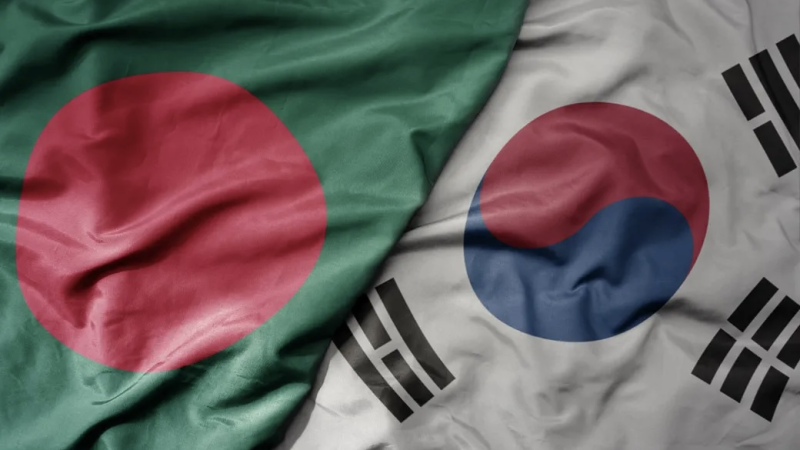- Martyr Mugdha's brother Snigdha steps into politics with BNP |
- FAO Warns of ‘Silent Crisis’ as Land Loss Threatens Billions |
- Indices tumble on both bourses amid broad-based sell-off |
- BNP Names 237 Possible Candidates for Polls |
- Bangladeshi leader of disabled people of world Dulal honoured |
Korea Seeks Trade Deal with Bangladesh to Boost Investment

Korea Seeks Trade Deal with Bangladesh to Boost Investment
South Korea has called for the early signing of a Comprehensive Economic Partnership Agreement (CEPA) with Bangladesh to further strengthen their five-decade-long partnership in trade and investment.
Speaking at a seminar on Korean investors’ corporate social responsibility (CSR) activities in Dhaka on Sunday, South Korean Ambassador Park Young-sik said the proposed CEPA would open “a new chapter” in bilateral relations. However, he noted that several challenges — including delays in visa processing, customs clearance, high import tariffs, and dollar payment bottlenecks — continue to hinder investment.
“Bangladesh remains a promising destination for Korean investors,” Park said, citing its growing economy, strategic location, and youthful workforce. “But to realise its full potential, it must improve the business environment by ensuring faster visa issuance, smoother customs procedures, and timely dollar payments after project completion.”
The envoy urged Bangladesh to allow easier repatriation of profits and reduce tariffs on raw materials and intermediate goods to enhance competitiveness for foreign investors.
Although Bangladesh’s exports to Korea have been rising steadily, Park said the volume was “not yet satisfactory.” He encouraged Bangladesh to diversify beyond garments and explore new sectors such as footwear, ICT, leather goods, light industry, and pharmaceuticals. A bilateral CEPA, he added, would accelerate growth in these emerging industries and expand Bangladesh’s access to the Korean market.
Infrastructure development remains another key area of cooperation. Since 1973, 144 Korean firms have participated in 257 infrastructure projects in Bangladesh worth around USD 8.82 billion. Park highlighted the Korean Export Processing Zone (KEPZ) in Chattogram, developed by Youngone Corporation, as a flagship example of long-term partnership. The zone employs over 70,000 workers and generates USD 1.25 billion in exports annually.
Bangladesh is also Korea’s third-largest recipient of official development assistance (ODA), supporting projects in education, health, sanitation, and transport. The Korea International Cooperation Agency (KOICA) has prioritised vocational and technical education to help bridge skills and technology gaps.
Park also praised Korean companies’ CSR initiatives in Bangladesh, noting that “CSR is not just a buzzword; it’s a commitment to giving back to the communities where we operate.” Examples include LG Electronics’ “Ambassador Challenge” and IT Academy with JAAGO Foundation, Samsung’s software training programmes, Woori Bank’s healthcare and scholarship projects, Dowha Engineering’s technical training, and Youngone’s “Blue & Green Initiative” in KEPZ, which has transformed barren land into a green hub with three million trees and Bangladesh’s largest rooftop solar power system generating 37 megawatts of renewable energy.
Reflecting on the broader partnership, the ambassador compared Bangladesh’s rapid progress with Korea’s own journey from aid recipient to donor nation. “Korea built its economy in just a few decades with international support,” he said. “We now wish to share that experience with other developing nations.”
Since establishing diplomatic ties in 1973, Korea and Bangladesh have enjoyed strong cooperation in trade, investment, and people-to-people exchange — with the RMG sector at its core.
“Korea does not pursue any strategic interests beyond economic cooperation,” Park said in conclusion. “Building on the achievements of the past 50 years, our two nations are determined to forge a brighter and more prosperous future together.”

